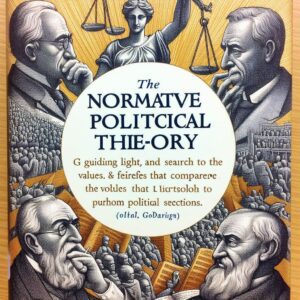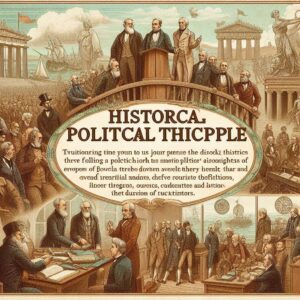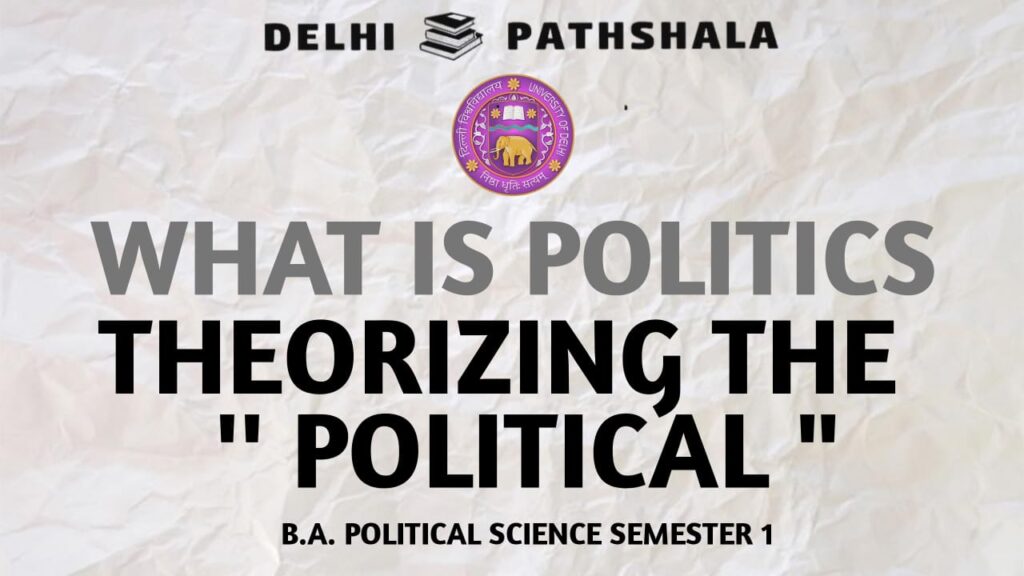In this post, notes of Unit 2 (Approaches to Political theory Normative Historical and Empirical) from DSC – 1 (Understanding Political Theory) are given which is helpful for the students doing graduation this year.
Approaches to Political Theory in political concept
1.normative approaches to political theory

- normative approaches to political theory is a guiding light, in search of to identify and compare the values and beliefs that must form political selections.
- Thinkers on this realm ponder questions of justice, fairness, and goodness, striving to broaden ideas that could manual us in navigating the intricacies of governance.
Key Concepts in Normative approaches to political theory
Justice:-
- At the heart of political debates, justice revolves across the fair distribution of advantages and burdens inside a society
- Theories like distributive justice suggest for aid distribution based totally on want, whilst corrective justice seeks to rectify harm or wrongs.
Liberty:-
- Liberty encompasses the liberty of individuals to behave and think without interference.
- Theories of liberty, inclusive of negative liberty emphasizing absence of interference and superb liberty emphasizing the ability to realize capacity, outline the bounds of freedom.
Equality:-
- Concerned with treating individuals or corporations as equals, equality theories range from formal equality advocating same treatment irrespective of situations to substantive equality addressing unequal consequences on account of social, economic, and cultural factors.
Challenges and Criticisms of Normative approaches to political theory
- Normative political concept isn’t without its demanding situations.
- Critics point to the difficulty of defining and measuring summary principles like justice, liberty, and equality.
- Moreover, the diversity of values throughout societies poses a challenge, in conjunction with capacity conflicts among one-of-a-kind principles.

2. Historical Approaches to Political theory
- Historical Approaches to Political theory invitations us to journey thru time, exploring the development and evolution of political thoughts and establishments.
- It scrutinizes the origins, contexts, and influences which have formed political thinkers and actions for the duration of records.
Key Figures and Periods in Historical Approaches to Political theory
Ancient Greek Philosophers:-
- Plato and Aristotle added principles like democracy, republicanism, and natural law, exploring questions of human nature, justice, and the perfect nation.
Medieval Political Thinkers: –
- Augustine and Aquinas incorporated religious and theological dimensions into political concept, addressing issues of divine authority, natural rights, and the commonplace properly.
Modern Political Philosophers:-
- Thinkers like Hobbes, Locke, Rousseau, and Kant challenged conventional assets of political legitimacy, presenting thoughts such as social settlement, consent, sovereignty, and the rights and duties of citizens.
Enlightenment Thinkers:-
- Figures like Montesquieu, Voltaire, and Smith expanded the scope of political inquiry, applying motive, empiricism, and liberalism to politics, economics, and society.
Revolutionary Thinkers:-
- Paine, Jefferson, and Marx criticized current political and social orders, advocating for democracy, equality, and emancipation, emphasizing the position of the humans in political trade.
Contemporary Political Theorists:-
- Responding to trendy challenges, figures like Rawls, Nozick, and Habermas address justice, liberty, equality, democracy, globalization, variety, pluralism, and conflict in political theory.
Challenges and Criticisms of Historical Approaches to Political theory
- While ancient political concept provides insights into the context and importance of political ideas,
- it faces demanding situations such as interpreting and comparing historic texts, capability bias in source selection, and figuring out the relevance of ancient theories to cutting-edge troubles.
3.What is Empirical Political Theory?
- Empirical political idea takes a systematic technique, aiming to have a look at and provide an explanation for empirical phenomena and styles of political conduct and institutions.
- It includes trying out and verifying hypotheses and theories in political technology to expect and decorate political effects and overall performance.
Methods and Tools in Empirical Political Theory
Statistics:-
- Utilizing statistical analysis to draw meaningful conclusions from information.
Surveys:-
- Collecting data via dependent questionnaires to collect opinions and insights.
Experiments:-
- Conducting controlled experiments to check precise hypotheses.
Case Studies: –
- In-depth exam of unique times or instances to draw broader conclusions.
Comparative Analysis:-
- Analyzing similarities and differences across unique political contexts.
Key Topics and Issues in Empirical Political Theory
- Empirical political principle covers a enormous array of subjects and problems, which includes political lifestyle, political socialization, political participation, political communication, public opinion, balloting behavior, political events, interest groups, social actions, political leadership, political illustration, political accountability, political institutions, political structures, political improvement, political exchange, political war, political cooperation, and political integration.
Challenges and Criticisms of Empirical Political Theory
- Despite its price in understanding the empirical truth of political behavior and institutions, empirical political principle faces challenges.
- These include difficulties in measuring and operationalizing political technological know-how principles, navigating the complexity and variability of political phenomena and information, and making sure the validity and reliability of empirical analysis.
In conclusion:-
- delving into the captivating global of political idea gives a rich and complete exploration of numerous processes—Normative, Historical, and Empirical—that grapple with essential questions that have perplexed thinkers for centuries.
- Normative Political Theory, as a guiding mild, seeks to perceive and examine the values shaping political selections.
- The exploration of key principles including justice, liberty, and equality presents a basis for navigating the intricacies of governance.
- However, this method isn’t without its demanding situations, with critics highlighting the problem of defining and measuring summary principles and the capacity conflicts amongst distinctive values.
- Historical Political Theory takes us on a journey thru time, unraveling the development and evolution of political thoughts and establishments.
- Key figures and durations, from Ancient Greek Philosophers to Contemporary Political Theorists, offer insights into the contextual and historical dimensions of political thought.
- Despite its valuable contributions, ancient political principle faces demanding situations in interpreting and evaluating historic texts and making sure relevance to cutting-edge problems.
- Empirical Political Theory, with its systematic and clinical technique, goals to study and provide an explanation for empirical phenomena and styles of political behavior.
- Utilizing strategies consisting of records, surveys, experiments, case studies, and comparative analysis, it covers a vast array of topics and issues in political technology.
- Nevertheless, demanding situations persist, including problems in measuring and operationalizing political technology principles and making sure the validity and reliability of empirical analysis.
- As we navigate via these distinct strategies, it will become glaring that political principle isn’t a monolithic subject but a dynamic and multifaceted discipline.
- Each technique contributes precise insights, and collectively they enhance our information of the complex global of politics.
- Whether we are taking into account normative standards, exploring the ancient roots of political thought, or using empirical strategies to observe political conduct, the look at of political concept stays an intellectually worthwhile enterprise.
- It equips us with the gear to grapple with enduring questions, fostering a deeper comprehension of the values, institutions, and behaviors that form political existence.
- So, in case you are intrigued by the arena of political concept, certainly, you are in for a deal with—an exploration that guarantees highbrow stimulation and a more appreciation for the complexities of governance and political phenomena.
Visit for more details:-
Understanding Political Theory


